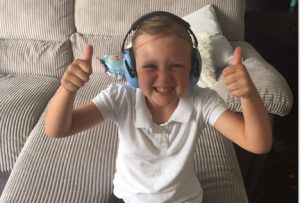A Diagnosis Is Not a Label
 “Why do you want to label your child?” I get asked this question much too often.
“Why do you want to label your child?” I get asked this question much too often.
I don’t, actually, and I’ll tell you why — I don’t like the term “label” and how it is defined by the people who choose to ask this question. It’s a dig, an insult; like they’re implying I want these “labels” for selfish or unorthodox reasons.
Autism is not a “label.” — My daughter didn’t get a diagnosis so I could make her wear a signboard listing her difficulties.
Attention Deficit Hyperactivity Disorder is not a “label.” — My daughter didn’t get a diagnosis so that I could excuse her behaviors.
Anxiety is not a “label.” — My daughter didn’t get a diagnosis to encourage people to be soft.
I could go on forever, right? Please insert any diagnosis and any theory you may have and then listen carefully. These disorders, disabilities, special needs, extra needs, or whatever other definition you wish to use, aren’t labels, they aren’t excuses, and parents like me whose children have these diagnoses are sick of hearing people call them labels. Professionals do it, friends do it, acquaintances do it without any thought or feeling for how this statement comes across to the people it is aimed at.
It is hurtful, it is judgmental, and it is completely unjustified.
People may say, “Why bother having her labeled when you are doing everything for her anyway?” or “Why do you have to label her when the school are giving the extra support” or “What’s the point in a label? All it will do is hinder her in the future with prospective jobs or relationships.”
Having my child diagnosed (which I sought out and fought for, I might add) wasn’t for my benefit; it was for the benefit of my daughter and the future she rightly deserves. Having a diagnosis enabled her to get access to other services she would not have received otherwise. Having a diagnosis enabled me to help others understand her appropriately and begin to use the correct strategies for her conditions. Having a diagnosis has enabled me to be signposted to the correct support groups, and training courses that I wouldn’t otherwise have been able to access.
These “labels” do not hinder my child’s future — they benefit it. These “labels” are needed for support and understanding. Not having a label will be used against you when you try to get further assessments and referrals. Even though a diagnosis is not legally necessary to obtain support and assessments, you WILL be told it is because funding is critically low and, as a diagnosis is proving more and more difficult to obtain, therein lies the problem of the merry-go-round service.
Have you ever heard a teacher or a person from the local authority say:
“I’m sorry, your child is not diagnosed, so we can’t refer her for this assessment.”
or:
“I’m sorry, but in order to have an educational psychologist assess your child, they need to have a diagnosis of X, Y, and Z first.”
or (and this is my pet peeve):
“I’m sorry, we cannot make an application for your child for an Education, Health and Care Plan, because she doesn’t have a diagnosis.”
This is NOT true!!!!!
But you see, who are we to question these professionals’ rules? On the start of my journey I was told all of these. None of them are true. Nothing is based on a child’s diagnosis, but to access the support and assessments, it seems we need it. Even though this isn’t what it states in the SEN code of practice, it seems that the “label” IS actually necessary.
Please don’t assume that I am labeling my child for any other reason than to help her. Please don’t think that these diagnoses are pointless; they are crucial because they give you the ability to access the correct support, and the referrals and other assessments needed in order to better your child’s situation.
Jodie Eaton
Latest posts by Jodie Eaton (see all)
- Autism Isn’t Just for Boys - November 28, 2017
- How a Dog Made Our Future More Hopeful - August 10, 2017
- Waiting Is the Worst - April 19, 2017



